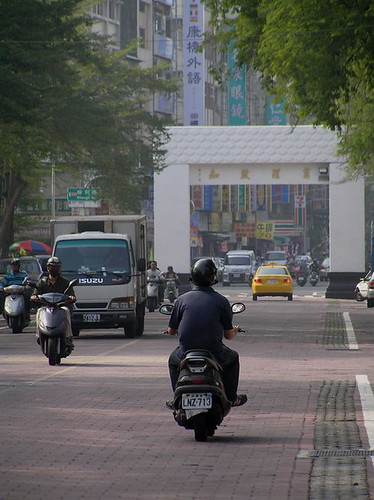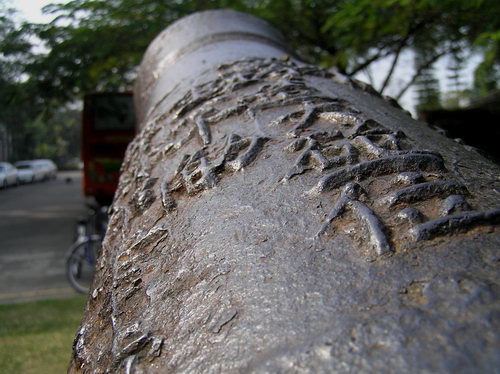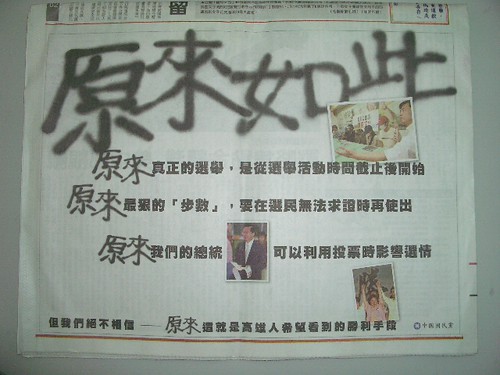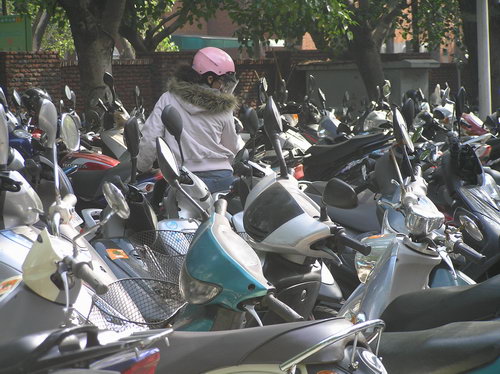Election Reflection

"I feel it is because they are weakened, if that is what you want to hear, Lord. Since the disaster by the Vedra they have been somewhat afraid to squelch the progress of mechanism with violence. It has also been said that there is internal strife in the City, between the demigods and what remains of their elders. Then there is the matter of the new religion. Men no longer fear Heaven so much as they used to. They are more willing to defend themselves; and now that they are better equipped, the gods are less willing to face them."
"Then Sam is winning. Across the years, he is beating them."
Another fun-filled Taiwan election has come and gone, with the usual allegations that the ruling party will be tested, Taiwanese dislike corruption, and swing voters will determine the outcome. The BBC has the CW:
Mayoral votes in Taiwan's two largest cities have ended, with the opposition winning in the capital Taipei but losing in the port of Kaohsiung.
The governing Democratic Progressive Party's candidate narrowly held on to the party's stronghold of Kaohsiung.
But the opposition Kuomintang party's candidate won a huge victory in Taipei.
A BBC correspondent says the result is not the crushing blow some had expected the government to suffer. The vote was seen as a key test for the government.
Many had portrayed the elections as a public referendum on President Chen Shui-bian's administration, following a series of corruption scandals.
The elections had been presented in the international media and in the local Blue media as a test of the President. They were not. They were about local politics, and were decided on voter identities as each party scrambled to get out its base. The DPP was successful in maintaining its vote, and the KMT recovered some of the base in Kaohsiung that had fallen away in 2002. Each party can take away successes from this election. Congrats are due all around.
The BBC, which is, at the moment, pro-KMT, regards Hau's victory in Taipei as 'huge.' It is true Hau won by 13 points, but the previous election saw Ma win by 28, and this time Frank Hsieh, a smart and energetic political campaigner, gained a 3 point increase over Lee Ying-yuan in 2002, while garnering 40% of the vote.
On the other hand, with his ascension to the throne of Taipei, Hau must be taken seriously as a presidential candidate a few years down the road, just as Ma was after he became Taipei mayor. This is especially true in the KMT, which does not have many strong candidates with appeal beyond the local level or beyond certain segments of the party.
The big loser in Taipei was not the DPP, but the PFP, which has melted away in its stronghold of Taipei, losing 4 of the 6 seats it held in the city council. The importance of these seats should not be underestimated -- by controlling city council seats, the PFP has a say in how the funds are doled out to local Taipei firms and organizations. Without one's hands on the money wheel, the ship of state tends to take a direction away from one's supporters (longtime Taiwan-watcher Lawrence Eyton's article on the Kaohsiung City Council election that was bought by Chu An-hsiung is a great introduction to local money politics on the Beautiful Island.)
Followers of the local politics will recall, of course, that in Taiwan politics is ruthlessly local, ruled by local faction arrangements often centered around local temple and benevolent associations that bring together politicians, business, and local organized crime. It always pays to give attention to what happens at the local level, and there we can see some surprising changes. In Taipei the DPP and its allies gained three seats; in Kaohsiung the KMT gained 5. That is in part the result of rampant vote buying, a chronic problem in Kaohsiung, since the DPP has slowly but surely been gaining ground on the KMT at the local level.
In Taipei Hsieh's strong showing, combined with gains for the DPP and the TSU, as well as the crushing blow to the PFP, amount to a DPP success -- certainly morally, if not in fact.

In Kaohsiung, things were just the opposite. Chen's Chu's narrow victory was almost certainly the result of the presence of the TSU candidate in the race. In 2002 the DPP won by more than 25,000 votes, 386K to 361K, with no TSU or PFP candidates in the race. In 2006, the KMT gained 17K votes to reach 378K -- which looks like a huge gain, until one recalls that in 1998 they spiked at 383K. Had they merely reached their 1998 levels, they would have won handily.
By the same contrast, the DPP's 379K vote was 7K less than 2002. One might argue that the DPP has fallen off, except that the TSU took 6,500 votes. The 2006 TSU + DPP total is 386K votes. Hence Chen Chu's showing was not some statistical blip or DPP failure, but the direct result of the TSU poaching votes from the DPP; the number of Green voters remains unchanged. Meanwhile the KMT gain was due entirely to success in getting out the vote, not to voters switching parties due to some putative disappointment with the DPP. Again, had the KMT reached its 1998 level, it would have won.
Another note: the invalid ballots, all six thousand of them. The majority of them have turned out to be ballots that were intended for Chen Chu, chopped incorrectly. Unlike the KMT, the DPP has not developed a system for mobilizing its voters and training them to vote properly. The same thing happened in the 2004 Presidential election, when the majority of the 300,000 invalid ballots that had recognizable votes appeared to be for Chen. Lots of people out there, especially seniors, who just don't get the system yet.
Meanwhile, lets think about these numbers. Two elections in a row, the Greens get 386,000 votes. The KMT gets 361K followed by 378K, down from a peak of 383K in Kaohsiung. The so called "light blues" or "light greens" don't exist. There is no middle. There are no swing voters. There is no segment of the electorate that policy arguments have to impress -- on many policies, everyone already agrees. Why are politics in Taiwan so identity oriented? Because victory doesn't depend on moving toward the middle to grab the swing voters, the way it might in the US. Victory depends on the simple ability to mobilize one's own base. Thus, the question Bruce Jacobs asked in an excellent piece in today's Taipei Times is answered:
This being the case, why has Ma since then courted the far-right of conservative politics? Why has he tried to do deals with People First Party Chairman James Soong (宋楚瑜 ) and gain the small minority of Mainlander votes rather than going for the localist Taiwanese center?
Why can't Ma move toward the middle? Because there is no middle. Where could Ma go that he wouldn't leave his Deep Blue base behind?

Who was tested? Well, the international media thought it would be Chen Shui-bian, but it looks like the big losers were James Soong and Ma Ying-jeou. The Taipei Times reported:
While a number of party legislators have voiced their frustration, lamenting the party's poor performance in Kaohsiung, and urged the party to place more emphasis on promoting localization, KMT Chairman Ma Ying-jeou (馬英九 ) interpreted the election results as a confirmation of the status quo and argued that the party expanded its support base in the southern city by attracting almost half of the votes.
What does this reveal? Well, one can hardly blame Ma for the loss in Kaohsiung. Candidate Huang lost by 1,000 votes and came within 5,000 votes of the KMT's peak Kaohsiung performance, gaining 17,000 votes on the 2002 total. In tightly-fought Kaohsiung, that's not too shabby, especially considering what a good job the previous DPP mayor, Frank Hsieh, had done there. Ma's spinning of the higher number as "expanding" the KMT's support base is completely bogus, but the effort in Kaohsiung almost paid off in victory. More importantly, the KMT added five seats on the all-important city council, which will enable it to make trouble for Chen Chu -- just as the KMT did for Chen when he was mayor of Taipei, and later, when he was President and the Blues had a majority in the legislature. If I were the KMT I wouldn't be overly unhappy.
I suspect that the legislators' attack on Ma reflects the ongoing, quiet campaign against him conducted by the politicians allied to Lien Chan and Wang Jin-pyng. The Kaohsiung loss is just an excuse for another iteration of calls for Lien to join Ma in the election. One of the analysts noted:
Failing to defeat a DPP embroiled in multiple troubles was nonetheless a frustration to the KMT and a serious setback for Ma, said Wang Yeh-lih (王業立), a political scientist at Tunghai University."Ma's leadership will be questioned, and he may have to compromise in choosing his partner in the 2008 presidential election in order to please the southern residents," he said.
In addition to being more "localized," Shih suggested that Ma should work on his relationship with former KMT chairman Lien Chan (
"Integrating different voices in the party is Ma's job. But he thought he could rule the party without Lien and Wang ... I don't think he is reflecting properly on his and the party's strategy judging from his reaction to the elections," Shih said.連戰 ) and Legislative Speaker Wang Jin-pyng (王金平 ), as the party's pro-localization faction has questioned Ma's leadership and suggested Lien pair up with Wang in 2008.
Cultural note: when you screw up in Chinese culture, you are supposed to "reflect" on what you have done. One of Shih Ming-teh's constant accusations against Chen Shui-bian was that he had failed to "reflect" on his behavior.
The spectacle of the KMT attempting to campaign on the corruption of the Other Party was certainly interesting, especially to manufacturers of irony meters, who were no doubt filling orders by the gross. It simply highlights one of the KMT's major problems: its inability to offer clear and bold policy solutions that capture voter imagination. Ma's reliance on negative campaigning is the inevitable outcome of the KMT being hamstrung by its own anti-Taiwan stance. A sophisticated understanding and offering of public policy would tend to reinforce positive governance on the island, which in turn tends to support Taiwan's ability to be independent -- an anathema to the KMT's ally, China. Thus, the easiest solution to the contradictions inherent in being a party dedicated to the elimination of independent governance is negative campaigning.
To be fair, as I noted earlier, since there is so often broad agreement on fundamental policies among supporters of both parties that the only real differences relate to the struggle over the island's identity. Everyone simply defaults to the constant negative campaigning on both sides -- still ongoing, as the anti-DPP ad below shows:

I thrice presented him a kingly crown,
Which he did thrice refuse: was this ambition?
Meanwhile, Soong. In the wake of his feeble showing in the Blue stronghold of Taipei, PFP Chairman James Soong announced his retirement from politics...
Having enjoyed a record-high 4.7 million votes in the 1994 Taiwan Provincial Governor election, People First Party (PFP) Chairman James Soong (宋楚瑜 ) yesterday announced an end to his decades-long political career after failing in his Taipei mayoral bid, garnering just 53,281 votes, or 4.14 percent of the total ballots.
Hahahaha. How many times have we seen this little play performed? Remember when Ma Ying-jeou wasn't going to run for mayor of Taipei, and his father had to "beg" him? Right on cue, Soong's followers tripped over themselves to fawn and clutch at his robes....
People First Party (PFP) lawmakers yesterday urged Chairman James Soong (宋楚瑜), who announced on Saturday that he would quit politics, to change his mind.
"It would be a loss to Taiwan and the Taiwanese people if Soong were to leave politics," PFP Secretary-General Chin Chin-sheng (秦金生) told a press conference
Calling Soong "indispensable" to the country and the party, Deputy Legislative Speaker Chung Jung-chi (
鍾榮吉 ) called on Soong to stay with the party at this "crucial moment."
Soong will be back, if for nothing else, then for revenge. Meanwhile the small parties, everyone agrees, are on their way out. If the PFP melts away after the 2007 legislative election, what then for Soong?

Who won? Taiwan won. Another successful democratic election was held. The close vote in Kaohsiung will motivate large turnouts in future polls. The good showing of Hsieh in Taipei reminds us that voters there have not given up on the DPP. The KMT's eternal complaining notwithstanding, the recount in Kaohsiung is a reasonable request for such a close election. Procedures were followed. The public once again becomes used to the normality of a world where it has a choice.
Life goes on.
[Taiwan] [DPP] [KMT] [Chen Shui-bian] [James Soong] [Taipei] [Kaohsiung] [Chen Chu] [Ma Ying-jeou]
















7 Comments:
If I read you correctly, you would support these claims:
1) Every voter has a clear sense of his or her "identity" (i.e., ethnic identity).
2) This sense of identity is the ultimate determining factor in how voters vote.
3) There can be no "middle" or "swing voter," because that option is precluded by the either/or nature of identity.
4) Candidates do not need platforms since they can rely on identity to get votes.
If so, then political change would seem to depend on a prior change in how Taiwanese people think about their identities. Is this your view?
I'm sure Michael has an answer to anonymous' questions, so I am only speaking for myself. I think identity is important, but the economic issue is also important. There are a lot of people that I know or have talked to who feel strongly about identity, but in their minds economic issues are more important. They want Taiwan to remain independent, but they also believe that there shouldn't be anything hindering economic and cultural exchange. They believe that Taiwan's economic problems result from the impediments on companies, the ceiling on investment in China, the lack of direct flights, etc. There are many local Taiwanese who share this view, especially working for big companies, which want unrestricted flow of capital. I think this type of person will tend to vote KMT, regardless of identity issues.
But then there are others who believe Taiwan's economic predicament is a result of China's flourishing economy (which certainly isn't something that China should be faulted for). They see all of the businesses moving to China, which means factories in Taiwan closing and more and more people out of work. They see traditional businesses (towels,etc) having to compete with Chinese counterpart companies (often owned by Taiwanese businessmen) that are able to sell their products in Taiwan at extremely low prices. They want the government to place anti-dumping tariffs on Chinese-made goods. They also feel that Taiwan shouldn't put all of its eggs in the basket of the Chinese economy. People in this camp will vote for the DPP or TSU.
I'm sure this is very simplistic; I'm not an economist. My only point is that neither of these is voting on identity alone, but I wouldn't say they or "middle" or "swing voters" either. I don't think there is much that the KMT could do to win over the second camp. The DPP could possibly bring back some in the first camp--the business community--by adopting some of the issues that the first camp is demanding (direct flights). They would do this, though, at the risk of losing their base, unless they could also address the kind of concerns of the second camp.
1) Every voter has a clear sense of his or her "identity" (i.e., ethnic identity).
2) This sense of identity is the ultimate determining factor in how voters vote.
I would go with (2) here but am not willing to cop to (1). I would say that the mainlander identity is much clearer to its adherents than the Taiwanese. Mainlanders appear to have a more powerful sense of who they are and appear to be more conscious of why they vote the way they do. Taiwanese seem to carry around lots of identities that all blend into each other in not so easy to delineate ways. That identity issue is most important as the "level" of election rises.
3) There can be no "middle" or "swing voter," because that option is precluded by the either/or nature of identity.
Yes, partly, and also because there is widespread agreement on the broad outlines of policy -- there's no debate over the treatment of foreign labor, or national health insurance or subsidies for universities or similar, because tend to agree that either its not their business or they approve. Where are the swing votes? I hear all the time that Deep Greens and Deep Blues are a minority and voters are all in the middle. If true, why are elections so predictable along political identities? As many locals aver, the KMT could nominate a dog in Taipei and still win the election. If the election was about policy, why was Hau elected?
4) Candidates do not need platforms since they can rely on identity to get votes.
What policy platforms did any of the candidates have? They ran on identity -- like Hau in Taipei -- or prior achievement -- like Hsieh. Nobody voted for Hau because of his position on the development of Sungshan airport or Taipei. They voted for Hau because he was the mainlander son of a reactionary mainlander father. If the election had been about administrative ability and policy skills, either Soong or Hsieh would have won hands down. Hau would have lost 80-20.
If so, then political change would seem to depend on a prior change in how Taiwanese people think about their identities. Is this your view?
Certain kinds of political change, perhaps. Much goes undiscussed. Where is the robust debate on renewable energy, for example? I think there needs to be more research into why topics remain off the table. For, as the wind machines in Hsinchu remind, policy change does not require that identities change -- merely that politicians who want to get into office to execute particular policies need to appeal to identities to get elected.
Another issue intertwined here is that Taiwanese conceive of political change as a top-down affair, like the friend of mine who chided me about buying an electric motorcycle "since the government hadn't required it yet." Hence, public policy is Someone Else's Business, the business of Authority. One reason that policy counts for so little is that so many ordinary people experience it as something that just happens, like the rain or gravity.
There are lots of reasons why campaigns are so negative and so identity-oriented.
Michael
Thanks for the responses. You guys are without a doubt the best source of analysis of politics on the island. I am just trying to understand what is going on in people's minds. In my (limited!) experience, it is "green" voters (usually very educated green voters) who tend to vote for KMT candidates, rather than the other way around. These are people who see the economic issue as Wulingren describes it. But I have not been here long enough to generalize from my own experience.
Bear with me for a second, but isn't the "independence" question really a question about "identity"? No one in Taiwan (and I mean _no one_) wants to unify with China as presently governed. This is simply a fact. So when KMT politicians play the Zhonghua card, they are really just appealing to WSR families' sense of identity. It seems to me that the DPP would be very foolish to underestimate the power of this identification. Grandpa joined the KMT army at 16 and suffered greatly, etc. You just don't get around that kind of thing, and the DPP is never going to break that sense of pride.
What the DPP (or somebody) needs to do is appeal to the WSR families' sense of "Chinese pride" -- in the interest of Taiwan! Know what I mean?
IMO, the identity does play a key role in Taiwan's election. However, the importance of identity varies greatly, especially depending upon the level of elections.
level of elections
For example, when voting to select the President, the identity plays far more critical role than it is when voting for legislators or city councilmen.
In those lacal elections, people would think that it doesn't determine Taiwan's future even if the city councils are all pro-green or all pro-blue, therefore the other factors step in, like "we are buddies for life so why don't you help me get elected" stuff like that.
Also, city councilmen are all about local affairs. If a guy cares only about independence or not but cares nothing about the local community, why do people give him votes? It would be a total waste of vote, simply because that in local elections a vote for independence doesn't convert to the power for independence (certainly, same for the unification).
Because of the nature of local elections, KMT would have advantages in local elections. Colonizing Taiwan for half a century, KMT has established a much deeper intertwined local network that will make the effect of 'peer pressure' much largely enhanced in local elections.
The above view is supported by the elections in the 2004 Presidential election and the election for lawmakers following it. The winning of Presidency by pan-green in 2004 seems to indicate that the "pro-independence identity" has greatly grown in such an unstoppable rate that, with all those unreasonable society-breaking behaviors of pan-bluers during the months after the President election, pan-green would have won the following lawmakers' election in a landslide manner. But instead pan-blue won significantly. Many people say that it's a sign of "shrink of pro-independence population", which IMHO is a misconcept because that conclusion ignores the effect of peer pressures in local elections.
localization
Other than the "varying peer presure effects in different level of elections," there is this 'localization effect."
For example, area where have higher concentrated pan-bluers (for example, Taipei) tend to vote more on identity than areas more pro-green reside. This is supported by the observation that in the pro-blue Taipei those candidates nominated by KMT, quality doesn't matter, always win by a large lead, yet in the pro-green Kaohsiung, DPP has to fight hard to just win the mayoral elections by a slim edge. What that means is
"pan-bluers tend to vote more on identity than pan-greeners do"
as pointed out by Michael above:
"Mainlanders appear to have a more powerful sense of who they are and appear to be more conscious of why they vote the way they do"
the last anonymous: No one in Taiwan (and I mean _no one_) wants to unify with China as presently governed.
This is probably not true. I believe that many pan-bluers don't really want the unification now, but still there are a considerably large portion of blue supporters can't wait to become citizens of PROC no matter what.
IMO these people simply don't think like what we think. Their points of view about lives, about humanity, about society ... are totally different from ours. The glory of "being part of a great Chian" probably plays far more important role than the roles of other issues like human right or democracy or how badly their poorer countrymen have to suffer.
Deep down, you can smell their discrimination against Taiwanese. It is a result of long time political manipulation, from the moment KMT decided to "follow Japanese policies of colonizing Taiwan" right after WWII, thru the sucking of Taiwanese resources in the years that followed (before 228 massacre) without any consideration for Taiwanese lives, thru the building of "Chinese superiority" during dacates of white horror ... most of pan-bluers unreasonable behaviors nowadays can be traced down to a mentality that they don't think Taiwanese deserve a chance of living "up" to their standards. It wouldn't be surprised to see people like that wanting Taiwan to be a forever slave of China asap.
Actually, polls in recent years always show that there are 5~10% want to unify with China right away. Converting based on 23,000,000 total population, it comes to a relatively huge number of one to two million who might want to slave Taiwan right away. The red army that created chaos in Taipei two months ago was only a very small portion of these people.
Post a Comment
<< Home